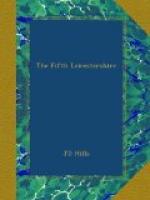Our second tour started on the 21st, and from this day onwards until we finally left the sector, we had a bad time. Our first trouble was the weather. Alternate frosts and thaws, rain and snow, soon filled our trenches with mud and slush, into which parapets and parados either crumbled gradually or collapsed wholesale. No sooner could we repair one length, than another would give way, and through it all many posts had to live with water over their ankles and no proper drying accommodation. There had to be three companies in the line, so 24-hour reliefs were impossible, and to increase our troubles our stay in a warm climate had made us less capable of standing the exposure to cold and wet, and there were many cases of trench fever, trench foot, and some pneumonia, while the health of all was considerably impaired. One of the most pitiful sights of the war was to see 20 of our men crawling on hands and knees to the Aid Post—their feet so bad that they could not walk.
Meanwhile the underground war was not as satisfactory as we should have liked, and the Boche undoubtedly had the upper hand in the mining. Our galleries were few and short, and in consequence useless for either offence or defence, while his were known to be near our trenches in several places. In one place between the right and centre companies the Lincolnshires had expected a “blow” at any moment, and evacuating their front line, had dug a new trench ten yards in rear of it. This seemed to have been sighted in such a haphazard sort of way that it was at once named the “Harry Tate” trench by some humorist, who pictured a Company Commander coming out and saying “What shall we do next? Let’s dig a trench.” And so they dug this one—quite useless, for it was bound to be engulfed by any mine which exploded under the front line. The Boche, however, thought more of the new trench than we did, and the day after it was built, bombarded it with heavy minenwerfer shells until it was unrecognisable.
In this state we found it when we came in for our second tour, “C” Company (Farmer) on the right and “A” Company (Ward Jackson) in the centre. Our first morning the Boche started just before midday, and for four hours rained heavy minenwerfer shells on these two Companies, and particularly on the new trench. Fortunately there was no one in this, and equally fortunately most of the shells fell between our front line and supports; there was a thick mist at the time, and it was almost impossible to judge their flight. Through it all Capt. Farmer walked calmly from post to post, cheering the garrison, and just before the end of the bombardment at 4-0 p.m., made his way down the small communication trench towards his support platoon. Thence he went to call on “B” Company, but was caught on the way back by a mortar, which he probably could not see coming in the mist (for no one was more accurate at judging their flight than he), and was killed instantly, being blown out of the trench and lost for several hours. Captain Farmer was perhaps the quietest, certainly the bravest, officer of his time, for he feared nothing, and nothing could shake his calm, while it was said of him that he was never angry and never despondent. When he was killed, “C” Company lost their leader, and every man his best friend, while the mess lost one who was the most cheerful comrade of every officer.




